
Two years ago today [9 July 2004], the International Court of Justice, in The Hague, gave its advisory opinion on the Separation Barrier. The judges held that building the barrier in the West Bank violates international law. Thus, the court held, Israel must tear down the sections that stray from the Green Line, cancel the accompanying permit regime, and compensate Palestinians whose rights were violated by the barrier. The court also urged the UN General Assembly and the Security Council to consider actions to end the illegal situation created following construction of the barrier in the West Bank. Read more about Two years after the ICJ's decision on the Separation Barrier
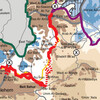
The Tel-Aviv Magistrate’s Court granted the appeal of residents of Sheikh sa’ed, in East Jerusalem , opposing the separation barrier, and cancelled the requisition orders that had been issued to build the barrier. The court’s appeals committee ruled that the planned route of the barrier would cause disproportionate harm to the daily lives of the residents, in part because it separates Sheik sa’ed from other neighborhoods of East Jerusalem . This is the first time that a court has voided a section of the separation barrier around Jerusalem . The appeal was filed by the Sheikh sa’ed Neighborhood Committee and five residents of the village, who were represented by attorney Ghiath Nasser. Read more about Section of separation barrier around Jerusalem ruled illegal - near Sheikh Sa'ed
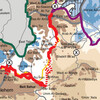
Sheikh Sa’ed is a neighborhood of the larger village of Sawahra. However, Sheikh Sa’ed is in West Bank, while the western part of Sawahra was annexed to East Jerusalem in 196. Israel planned to build the Separation Barrier between Sheikh Sa’ed and the rest of the village, which would cut off the neighborhood’s only access road to the outside world. The Tel-Aviv Magistrate’s Court voided this portion of the Separation Barrier, ruling that it would cause disproportionate harm to the daily lives of the neighborhood’s residents. The court rejected the state’s argument that the residents constituted a security threat. Read more about Israeli appeals court voids section of Wall in Jerusalem
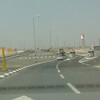
Israel imposes severe restrictions on the movement of Palestinians in the Jordan Valley, the eastern strip of the West Bank, which it has in effect annexed. This is the finding of B’Tselem’s recent research. As a rule, the army forbids the entry of Palestinians to the Jordan Valley, and only allows entry of those Palestinians listed as residents of this area. Severing the Jordan Valley from the rest of the West Bank severely violates the human rights of the Palestinian population. These measures were taken without any government decision or notice to the public. Testimonies given to B’Tselem indicate that the IDF forbids the movement of Palestinians along Route 90, which runs the length of the Jordan Valley. Read more about Research shows that Israel has effectively annexed the Jordan Valley
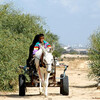
In response to the Qassam rockets fired from the northern Gaza Strip at Israeli communities and army bases in Israel , the army announced it was beginning Operation Blue Skies. As part of the operation, the army called on Palestinians living or present in the area to leave by 6:00 P.M. Wednesday. According to media reports, the army intends to open fire at any person who enters the area, regardless of the person’s identity or reason for being there. An order to open fire at any person present in a particular area in the northern Gaza Strip, would constitute a flagrant breach of International Humanitarian Law. Indiscriminate gunfire at every person who enters a particular area is patently illegal, and can lead to the commission of war crimes. Read more about Creation of "Death Zone" in northern Gaza Strip is illegal
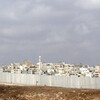
In June 2002, the government of Israel approved the first stage of a physical barrier that will separate the West Bank and Israel. The official reason for the decision was the wave of suicide attacks carried out by Palestinians against Israeli citizens in the preceding months. Over the next three years, the government and the Political-Security Cabinet approved additional stages of the barrier, as well as changes in the route in previously approved sections. In accordance with the government’s last decision, in February 2005, the barrier is expected to be 680 kilometers in length. As of November 2005, one-third of the entire barrier has been built, one-third is under construction, and the construction of one-third of the barrier has not begun. Read more about Routing the Separation Barrier to enable the expansion of Israeli settlements

During this year’s olive harvest, B’Tselem has once again documented attacks by settlers against Palestinian farmers and their property. In light of past experience, the Israeli security forces should have taken action in advance to protect the Palestinian harvesters. Instead, in many cases, IDF and police personnel have stood by and left the farmers to the mercy of their attackers, who sometimes even received assistance from security personnel. For example, on 9 November 2005, several female settlers arrived at an olive grove in the area of Ramallah and attempted to steal two bags of olives that had been harvested the same day. Read more about Olive harvest once again marred by settler violence
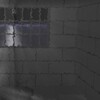
The Israeli Ministry of Justice proposes a law that will allow non-residents of Israel who are suspected of having committed security offenses to be held almost completely incommunicado for fifty days. The bill, which is proposed as a temporary order that will remain in effect for one year, passed its first reading in the Knesset plenum on October 31. It will now be examined in Committee before returning to the plenum for the second and third readings necessary to enact into law. If enacted, the law will severely breach the fundamental rights of suspects in criminal proceedings, and increase the risk of maltreatment during interrogation. Read more about Bill enabling prolonged incommunicado detention passed its first reading in the Knesset plenum
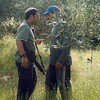
This year’s olive harvest season in the West Bank has begun. The harvest comes in the wake of extensive damage to the groves during the construction of the Separation Barrier, and strict restrictions on movement imposed on Palestinian farmers trying to access their land west of the Barrier. Many farmers received a permit for the harvest season, but were not allowed to reach their land during the course of the year. Since they were unable to work their fields during the year, they will now find their fields in poor condition. As a result, the harvest will be more difficult and yield a smaller crop. The restrictions on movement due to the barrier are in addition to those the IDF has imposed for a number of years on Palestinians whose agricultural lands lie near settlements and outposts. Read more about Olive harvest begins under the shadow of restrictions on movement
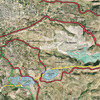
The expansion of settlements in the West Bank has been a primary consideration in setting the route of many sections of the Separation Barrier. This is the conclusion of a report released today by B’Tselem and Bimkom: Planners for Planning Rights, following this morning’s High Court decision regarding the Barrier around the settlement of Alfe Menashe. Under the Guise of Security proves that, contrary to the state’s claim that the Barrier’s route is based solely on security reasons, the main consideration in setting the route in some locations was to include on the “Israeli” side of the Barrier areas which are slated for settlements expansion. In some cases, the expansion amounts to the establishment of new settlements. Read more about Barrier Route was Planned to Enable Settlement Expansion









